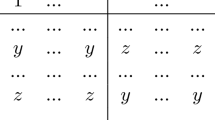Abstract
In a recent article, Quesada (Soc Choice Welfare 20 363–370, 2003) showed that if, for strict preferences, a unique strongly unanimous Choice Function (CF) is used to aggregate preferences position-wise then the resulting Social Welfare Function (SWF) is dictatorial. We show that this result is still true if one allows the use of different choice functions, one for each position. We also show that allowing choice functions not to be unanimous leads to SCW that are perm-dictatorial or imposed. We also show a way to set a dual problem to the one exposed in Que03, namely only perm-dictatorial and imposed SWFs can be decomposed into several Dual Choice Functions.
Similar content being viewed by others
References
Quesada A (2003) Positional independence in preference aggregation. Soc Choice Welfare 20:363–370
Author information
Authors and Affiliations
Corresponding author
Additional information
An anonymous referee is thanked for his useful remarks.
Rights and permissions
About this article
Cite this article
Nicolas, H. Positional Independence in Preference Aggregation: A Remark. Soc Choice Welfare 27, 341–345 (2006). https://doi.org/10.1007/s00355-006-0124-0
Received:
Accepted:
Published:
Issue Date:
DOI: https://doi.org/10.1007/s00355-006-0124-0



